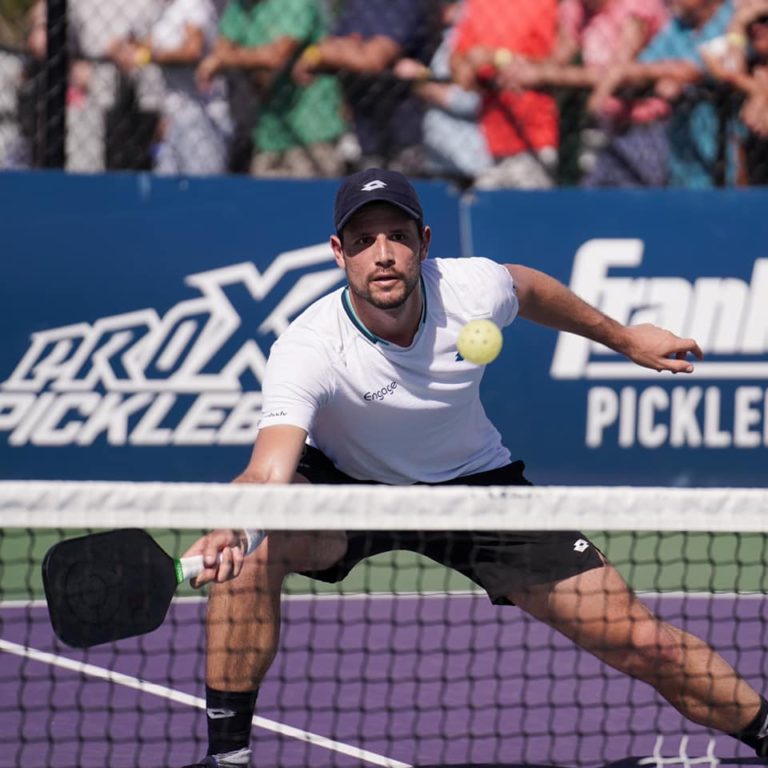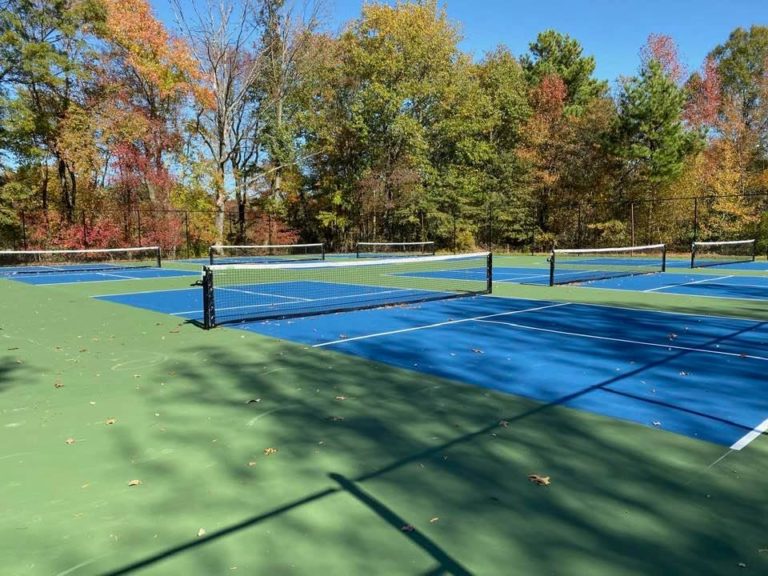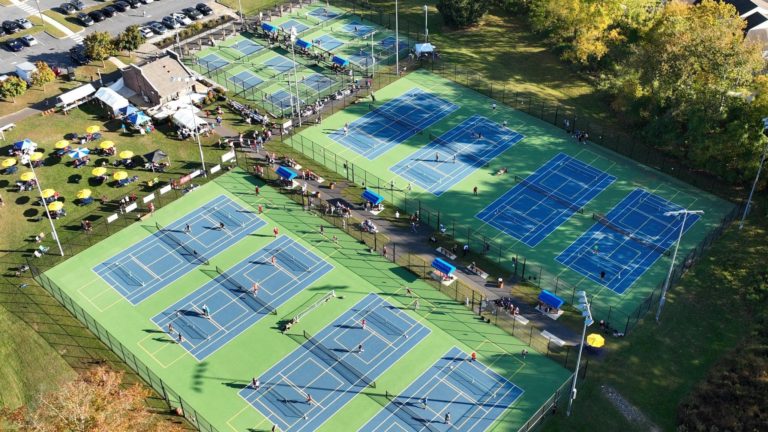Introduction
What is Pickleball?
Pickleball is a sport that has been growing in popularity in recent years, especially among older adults. It was invented in 1965 by three dads on Bainbridge Island, Washington who wanted to create a game that was easy for their families to learn and play.
It combines elements of tennis, badminton, and ping pong and is played on a smaller court with a lower net and lighter paddles. The game can be played as singles or doubles, making it a versatile activity for all ages.
The Importance of Winning
In any competitive activity, winning is the ultimate goal. Pickleball players are no exception.
Winning brings feelings of satisfaction, accomplishment and the thrill of victory that many people crave. However, winning isn’t just about being better than your opponent or having more points on the scoreboard.
It’s also about personal growth and development. When you win at pickleball, it can boost your self-confidence and self-esteem.
You feel like you can conquer anything when you’ve succeeded in achieving your goals on the court. Additionally, winning can teach important lessons about perseverance and grit; after all, without losing sometimes along the way there may never be an opportunity to truly savor these victories when they do come.
The Psychology Behind Winning
To consistently win at pickleball requires skill but also mental strength and strategy as well as physical prowess. Understanding how our brains work under pressure can make all the difference between coming out victorious or crumbling under stress. In this article we will explore some of the psychological factors that impact performance in pickleball such as mindset strategies like using positive self-talk to increase confidence; adapting playing style so as to capitalize on an opponents weaknesses; managing emotions effectively while playing; practicing team communication skills with partners — just to name a few! By grasping the psychological components of pickleball, one can enhance their skills and increase their chances of coming out ahead on the court.
The Mindset of a Winner
Positive Self-Talk and Visualization: The Power of the Inner Voice
The words we tell ourselves can have a significant impact on our performance in pickleball. Positive self-talk is a powerful tool that can help us stay motivated, improve confidence, and reduce anxiety on the court.
It involves using optimistic statements to reinforce our abilities and strengths as players, such as “I am a skilled player” or “I have excellent control over my shots.” Visualization is another technique used by successful pickleball players.
It involves mentally rehearsing successful scenarios in your mind’s eye, allowing you to prepare for and envision winning outcomes. By visualizing success, you create a roadmap for your subconscious mind to follow when it comes time to compete.
Confidence and Mental Toughness: Believe in Yourself
Confidence is one of the most crucial factors in winning at pickleball. A confident player is not afraid to take risks and will remain calm under pressure, even in tight situations. Mental toughness is closely linked with confidence, but it goes beyond just feeling secure; it’s having the ability to stay focused on the task at hand despite distractions or setbacks.
One proven way to build confidence is through consistent practice. As you develop your skills through training drills or matches, you’ll gradually become more comfortable with your abilities – which translates into greater self-assurance while playing.
Focus and Concentration: Staying Present in the Moment
Focus and concentration are vital elements of successful pickleball play because they help keep players centered during games where distractions can run rampant. Developing focus requires establishing priorities before each game – what are your goals?
What areas do you need to work on? Once these priorities are established, players must concentrate on these objectives throughout each point played.
Concentration also entails being aware of potential distractions, such as crowd noise or emotional turmoil. Sometimes, players will need to “tune out” these distractions and focus on the task at hand.
Players can do this by practicing mindfulness techniques like deep breathing or visualization exercises that promote calm and focused thinking. By honing their focus and concentration skills, players are better equipped to handle tough matchups on the court.
Strategies for Winning in Pickleball
Understanding Your Opponent's Weaknesses
Knowing your opponent’s weaknesses is a key strategy for winning in pickleball. It can be hard to identify their weaknesses, especially if you’re up against someone you’ve never played before.
One way to figure out your opponents’ weaknesses is by observing them during warm-ups or the start of the game. You can also pay attention to how they react to certain shots and strategies during the game. For example, if they keep running around their backhand to hit a forehand, this means they don’t want to hit backhands!
Once you’ve identified their weak points, try to use this knowledge to your advantage. So, to use the example above, if you notice that your opponent struggles with backhand shots, try hitting more balls towards their backhand side!
Or if they have difficulty returning lobs, use this shot more often. By exploiting their weaknesses, you can gain an advantage and increase your chances of winning.
Adapting to Different Playing Styles
Every player has a unique playing style that may differ from your own. Some players prefer playing defensively while others are more aggressive on the court.
Adapting to these different styles is crucial for winning in pickleball. If you are playing against a defensive player who likes slowing down the game, try using drop shots or lobs which require them to move around more and may force them out of their comfort zone.
On the other hand, if you’re up against an aggressive player who likes hitting powerful shots, focus on returning balls closer to the net where they may have less time to prepare their strokes. Learning how different players approach the game will help you adapt and adjust your strategies accordingly.
Playing to Your Strengths
Playing to your strengths is another important strategy for winning in pickleball. Every player has their own set of skills that make them unique on the court.
Whether it’s strong serves or good footwork, focusing on your strengths will help you play your best game. One way to play to your strengths is by dictating the pace of the game.
If you have a strong serve, use it to control the tempo of the game and force your opponent to play on your terms. Alternatively, if you’re great at moving around the court, try to keep rallies going longer and wear out your opponent.
By playing to your strengths, you can maximize your potential and make it harder for opponents to beat you. However, it’s important not to rely too heavily on one particular skill or strategy as this can make you predictable and easier for opponents to counter.
Overcoming Challenges
Dealing With Mistakes and Setbacks
Mistakes and setbacks are a natural part of any sport, including pickleball. It’s important to learn from your mistakes rather than dwelling on them. One effective way to deal with mistakes is to analyze what went wrong and come up with a plan for how to improve in that area.
For example, if you missed a shot because your timing was off, you might practice that specific shot until you feel more comfortable with it. It’s also important to avoid letting mistakes affect your confidence and mental state.
This can be difficult when playing in high-stress situations like tournaments or important matches. However, if you stay focused on the process of learning and improving rather than fixating on the outcome of one mistake, it can help you move past errors more quickly.
Managing Emotions on the Court
Emotions can run high during pickleball matches, especially when tensions are high or the game is close. Being able to manage your emotions effectively is crucial for maintaining focus and avoiding making rash decisions. One effective technique for managing emotions is mindfulness meditation, which involves focusing on your breath and observing thoughts without judgment or attachment.
This can help create space between your emotions and actions so that you can make rational decisions in the heat of the moment. Another tactic is visualization – imagining yourself staying calm under pressure during a match – which can help prepare you mentally for challenging situations.
Staying Motivated During Long Games
Pickleball games can last anywhere from 10 minutes to several hours depending on the format or tournament rules. Staying motivated throughout a long game requires both physical stamina and mental fortitude. One way to stay motivated is by setting small goals throughout the match – such as winning a certain point or executing a specific shot – rather than focusing solely on winning or losing. Focus on one point at a time.
Additionally, it’s important to stay fueled and hydrated throughout the game to maintain energy levels. This can involve eating small snacks or drinking sports drinks during breaks between games.
The Role of Teamwork
Communication With Your Partner
Pickleball is a team sport, and communication with your partner is key to winning matches. Effective communication can include discussing strategies before the game, giving feedback during the match, and staying positive and supportive even during mistakes or setbacks.
One effective way to communicate with your partner is by using nonverbal cues – such as hand signals or eye contact – to indicate where you plan to hit the ball or what type of shot you plan to execute. This can help avoid confusion on the court and increase overall coordination between partners.
Supporting Each Other on the Court
Playing pickleball with a partner means supporting each other throughout the match. One way to do this is by staying positive even when things aren’t going well. Encouraging words and gestures – such as high-fives or fist bumps – can help boost morale during challenging moments.
It’s also important for partners to be aware of each other’s strengths and weaknesses so that they can play together effectively. For example, if one partner has a powerful backhand but struggles with overhead shots, their teammate might focus on covering overheads while giving their partner opportunities to use their backhand.
Communication With your Partner: The Key to Success
In pickleball, communication between partners is crucial. It allows you both to be on the same page and gives you an advantage over your opponents. By communicating with each other, you can ensure that you are in the right position on the court, anticipate your opponent’s moves and adjust your strategy accordingly.
One way to communicate effectively is to establish a system of signals with your partner before the game starts. This can include hand signals or calls that indicate where each player should move on the court or when to switch positions.
It’s important to keep these signals simple and consistent so that there is no confusion during gameplay. Another important aspect of communication in teamwork is giving feedback constructively.
Instead of criticizing or blaming each other when mistakes happen, use clear language and positive reinforcement. Discussing strategies and areas for improvement after a game can help enhance your teamwork skills.
Supporting Each Other on the Court: Building Trust
Supporting each other on the court promotes trust between partners, which in turn improves performance. When a team member makes a mistake, it’s important for their partner to be supportive rather than critical or dismissive.
Encouragement helps teammates stay focused and motivated throughout the game. It’s also crucial for teammates to support each other physically while playing pickleball.
This includes making sure that each person has ample space needed for their respective shots as well as actively helping out in covering territory they may struggle with. Another way to show support is by celebrating successes together!
Be it an excellent return shot or winning a long rally – cheer on one another! Overall, strong communication skills paired with mutual support help build trust within a team dynamic which ultimately results in better gameplay experiences.
The Importance of Teamwork in Pickleball
Teamwork is one of the most important elements of winning in pickleball. Effective communication, constructive feedback and mutual support are all key components that can help improve your performance on the court. Remember to establish a system of signals with your partner, give feedback constructively, support each other physically and celebrate successes collectively – this will go a long way towards building trust that can help you win more games!
The Importance of Practice
Practice is an essential ingredient for winning in any sport, including pickleball. It’s a time to hone skills, develop strategy and build the mental toughness required to succeed on the court.
The more you practice, the better you will become at executing different shots, reading your opponent’s moves, and reacting quickly to changing situations. With each practice session, you can improve your overall game and increase your chances of winning.
Drills to Improve Skills and Strategy
There are several drills that can help improve your skills and strategy in pickleball. One effective drill is practicing your serve. Focus on hitting a variety of serves such as short serves, deep serves, or spin serves.
Additionally, work on being able to serve from both sides of the court effectively. Another valuable drill is working on your dinking technique.
This involves hitting slow shots over the net that land softly in the opponents’ non-volley zone (NVZ) which will allow for better court coverage with less risk of making an error. Practicing different defensive shots like backhand drives or lobs can help prepare for any situation during a game resulting in more control over each point played.
Mental Practice Techniques
Mental practice techniques are critical for developing confidence and consistency in pickleball. Visualization is one such technique that involves imagining yourself executing a particular shot or move correctly repeatedly until it becomes instinctive during actual gameplay. This can be useful when dealing with high-pressure situations like match points where visualization helps create a sense of calmness by allowing you to focus only on what needs doing rather than letting negative thoughts take over.
Another mental practice technique is meditation which helps reduce anxiety levels by calming the mind down. It creates focus and concentration during gameplay that can result in fewer errors made overall.
Setting goals that are specific and measurable allows players to track their progress as they work towards their objectives.This includes setting aside time to reflect on what worked and what didn’t during past practices so that you can focus on areas of improvement. Winning at pickleball requires a combination of physical skill, mental strength and strategic thinking.
Practicing regularly can help build these skills and techniques, allowing you to reach your full potential on the court. Additionally, it will help you be better prepared for high-pressure situations and improve your chances of success in competitive games.
Conclusion
Pickleball is a sport that requires both physical and mental skill. Winning in pickleball is not only about your ability to hit the ball but also your mindset, your attitude towards challenges, and your ability to work with a partner.
The psychology of winning in pickleball may seem like an abstract concept, but it can make all the difference in how successful you are on the court. In this article, we have explored various aspects of the psychology of winning in pickleball.
We have talked about how having a positive mindset can help you win more games, and how visualization and self-talk can improve your confidence. We have also discussed strategies for winning, such as understanding your opponent’s weaknesses and adapting to different playing styles.
Perhaps most importantly, we have emphasized the importance of teamwork and communication with your partner. This aspect of pickleball cannot be overstated; playing well with a partner who communicates effectively can mean the difference between winning and losing.
Applying psychological principles to your game will not only make you a better player but also enhance your overall enjoyment of the sport. Having greater control over your thoughts and emotions on the court increases your resilience as well as your quality of life off-court by improving your stress regulation abilities.
By practicing these strategies regularly both on- and off- court , players become increasingly aware of their reactional patterns thus improving their ability to overcome challenges on-court while enhancing their mental health overall. So keep these tips in mind next time you step onto that pickleball court – they could be just what you need for that extra edge!





